

The Cabin in the Woods is a supernatural genre-bender penned by Joss Whedon and Drew Goddard. It is a bizarre story that grows odder as it goes, but there is a focus on character, a decent atmosphere, success in keeping a young and handsome cast from becoming mere plastic eye candy, some intelligent dialogue and a few inspired approaches to scenes. There was enough skill involved in its creation to make a fine work. It had me at the opening; it kept me as events unfolded; it lost me at the end.
To summarize the plot past a certain point is to risk ruining a first viewing. At the beginning, five college students go to a cabin in a woods to spend a weekend drinking, playing games, and committing acts that many religions proscribe outside of matrimony. It is safe to share that the students are being monitored and manipulated, because this aspect is revealed from the outset. From the conversations of the monitors we piece together that the students are going to be put through some sort of gruesome trial, and that these students will, unwittingly, determine the nature of that trial. Beyond that I prefer to say only that beneath this bizarre surface is a whole lot more story to be uncovered.
There are a number of things the movie gets right. Despite the fact that the nature of the cabin is explained early on, there is still a mood of enigma about everything. The monitors become the mystery, rather than the cabin. The dialogue, despite Whedon’s continuing penchant for corny one-liners at the wrong moment, is streamlined, full of character, and delivers just enough information without talking directly to the audience. Tantalizing phrases suggest a deeper plot, hints of which are continuously doled out to us. Even one aspect that seemed initially disappointing, regarding the trite order in which characters must die in a horror movie, is given a surprising yet sufficient explanation later on.
[continue reading…]
Help Promote Prometheus Unbound by Sharing this Post


The latest craze to seize the literary world has been transformed, according to the law of Hollywood, into cinema. The Hunger Games, based on the novel by Suzanne Collins, is helmed by Gary Ross and co-written by the author herself. Targeting a younger crowd, the movie yet boasts enough maturity and craftsmanship to appeal to other demographics. I continue to await the next science fiction masterpiece, but if the interlude between masterpieces had more movies of this caliber, I would gripe a good deal less.
In the world of the story, an Empire has put down a rebellion by thirteen districts. The thirteenth district was destroyed and the other twelve must, each year, supply a male and female between the ages of 12 and 18 to participate in the Hunger Games. The 24 participants train for a few weeks before competing in a winner-take-all gladiatorial contest that leaves only one alive. Interspersed in their training are interviews with the media, banquets, and chances to impress viewers and thereby win sponsors who can assist the contenders during the competition.
Katniss Everdeen (Jennifer Lawrence) is a young girl in district twelve. She hunts for food in forbidden territory but is permitted to do so because she sells much of her catch to the guards (the first in a series of welcome demonstrations of governmental corruption). When her younger sister’s name is pulled as the female representative for the Games, Katniss demands to go as a volunteer in her stead.
[continue reading…]
Help Promote Prometheus Unbound by Sharing this Post
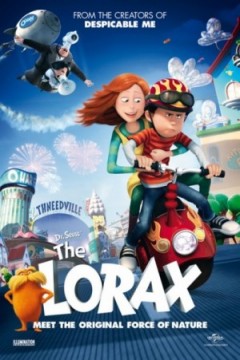
Anyone who read Dr. Seuss’s The Lorax as a kid might dread the movie version. No one really needs another moralizing, hectoring lecture from environmentalists on the need to save the trees from extinction, especially since that once-fashionable cause seems ridiculously overwrought today. There is no shortage of trees and this is due not to nationalization so much as the privatization and cultivation of forest land.
And yet, even so, the movie is stunning and beautiful in every way, with a message that taps into something important, something with economic and political relevance for us today. In fact, the movie improves on the book with the important addition of “Thneed-Ville,” a community of people who live in a completely artificial world lorded over by a mayor who also owns the monopoly on oxygen.
This complicates the relatively simple narrative of the book, which offers a story of a depleted environment that doesn’t actually make much sense. The original posits an entrepreneur who discovers that he can make a “Thneed” — a kind of all-purpose cloth — out of the tufts of the “Truffula Tree,” and that this product is highly marketable.
Now, in real life, any capitalist in this setting would know exactly what to do: immediately get to work planting and cultivating more Truffula trees. This is essential capital that makes the business possible and sustainable through time. You want more rather than less capital. An egg producer doesn’t kill his chickens; he breeds more. But in the book (and the movie), the capitalist does the opposite. He cuts down all the trees and, surprise, his business goes bust.
The book ends with the aging capitalist regretting his life and passing on the last Truffula seed to the next generation. The end. However, the movie introduces us to the town that is founded after this depletion occurs. It is shielded off from the poisoned and depleted world outside, and oxygen is pumped in by the mayor who holds the monopoly on air and builds Lenin-like statues to himself. The people eventually rise up when they discover that “air is free” and thereby overthrow the despot, chopping off the statue’s head.
It was this line about how air is free that clued me in to the movie’s possible subtext. You only need to add one metaphor to see how this movie can be the most important and relevant political-economic drama of the season.
The metaphorical substitution is this: The Trees are Ideas.
[continue reading…]
Help Promote Prometheus Unbound by Sharing this Post
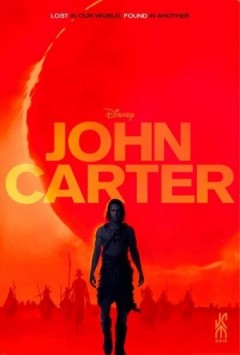
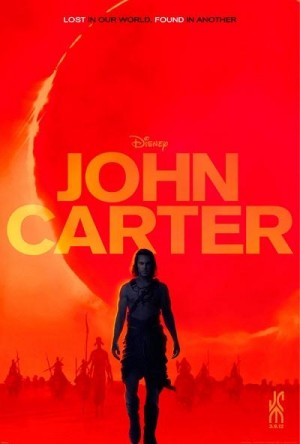 There is a certain charm to the recently released John Carter, helmed by Andrew Stanton. The two leads, Taylor Kitsch’s John Carter and Lynn Collins’s Dejah Thoris, have enough chemistry to draw the audience in; the world of Mars itself is a treat for the eyes; the basic plot is well within the bounds of standard epic adventure but perfectly sound; and many of the situations that the characters find themselves in have real potential, albeit never fully realized. In short, there was a grand story there for the telling, had there been a director capable enough to pull it off. There was not, and consequently a theatergoer is likely to leave feeling frustrated by the large gap between what was and what might have been.
There is a certain charm to the recently released John Carter, helmed by Andrew Stanton. The two leads, Taylor Kitsch’s John Carter and Lynn Collins’s Dejah Thoris, have enough chemistry to draw the audience in; the world of Mars itself is a treat for the eyes; the basic plot is well within the bounds of standard epic adventure but perfectly sound; and many of the situations that the characters find themselves in have real potential, albeit never fully realized. In short, there was a grand story there for the telling, had there been a director capable enough to pull it off. There was not, and consequently a theatergoer is likely to leave feeling frustrated by the large gap between what was and what might have been.
After a useless prologue that actually ruins the later effect when the protagonist appears on Mars for the first time, we are introduced to John Carter, a former officer of the Confederacy and current gold prospector. When the United States army tries to conscript him to fight the Apaches in Arizona, he tells them he owes them nothing and prefers to go about his own business. This defiance of the state should not excite the libertarian too much, however, because just moments before, he was busy abusing the rights of a shop owner, refusing to leave the man’s store when he wouldn’t sell. Carter’s reticence to join and fight, it turns out, is more about his bleak personal cynicism after the deaths of his wife and child than it is about a freedom-friendly moral code.
In the course of his attempt to escape the clutches of the war machine, he stumbles upon a cave where he is ambushed by a strangely dressed man with seemingly magical powers (the reason for the ambush is never made clear, though one cannot help but notice that the plot would have come to a standstill without it). After killing the ambusher, Carter takes a medallion from his cadaver and gets transported to a strange land he eventually learns is the planet Mars. He discovers he has extraordinary new powers with which he amazes some of the creatures he finds there.
Eventually, he meets a woman, a princess, fleeing an arranged marriage that could stop a war between two city-states. She wants to use him and his incredible physical prowess for her ends, which are to save her city-state from destruction without getting married; he wants to use her for his, which are to return to Earth with the help of her esoteric knowledge of his amulet. They form a distrustful alliance and adventure ensues. I’ll leave it to the reader to guess whether or not they fall in love.
[continue reading…]
Help Promote Prometheus Unbound by Sharing this Post
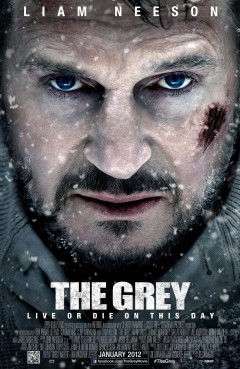
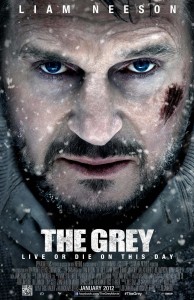 When an airplane bound for Anchorage, having departed from a remote oil refinery, crashes into a frigid Alaskan mountain removed from any sign of civilization, the handful of survivors must band together against the cold and the pack of wolves following them. Such is the scenario in director Joe Carnahan’s The Grey. If you think you have seen it before, you probably have, but probably not like this. The title is fitting both as a description of the bleak snowscape in which the actors find themselves as well as the mood that informs the work, that of an agnostic’s uncertainty and despair.
When an airplane bound for Anchorage, having departed from a remote oil refinery, crashes into a frigid Alaskan mountain removed from any sign of civilization, the handful of survivors must band together against the cold and the pack of wolves following them. Such is the scenario in director Joe Carnahan’s The Grey. If you think you have seen it before, you probably have, but probably not like this. The title is fitting both as a description of the bleak snowscape in which the actors find themselves as well as the mood that informs the work, that of an agnostic’s uncertainty and despair.
I do not expect to see another movie this good until December, unless recent trends are bucked. It is far more than a harrowing survival tale. It is also a very thoughtful piece, something made not by a technician, but by an artist. To be perfectly honest, after seeing Smokin’ Aces and The A-Team, I did not think that Joe Carnahan had it in him. But he has crafted a very effective bit of cinema, something that can appeal to someone looking for some subdued tension and sudden thrills as well as a movie-goer more sensitive to metaphors and in a more introspective mood.
The opening shots of the movie are arresting in their austerity, atmospheric in their composition. It quickly becomes apparent that time will be spent creating a character to care about. Liam Neeson, playing John Ottway, is a man who is burnt out on life, who has, in some undefined way, lost the woman he loves. He puts the business end of a loaded rifle in his mouth, and only the howling of a wolf distracts him from his suicide. He misses the window of opportunity, the moment of resolve. I was intrigued, but it was not until after the plane crash that I was sold.
[continue reading…]
Help Promote Prometheus Unbound by Sharing this Post
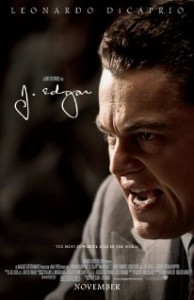
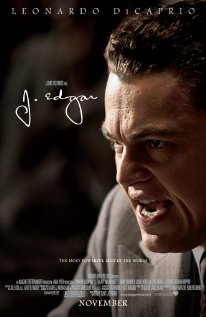 J. Edgar, the new film directed by Clint Eastwood and starring Leonardo DiCaprio, is making the news for dealing frankly with the decades old rumors concerning Hoover’s private life. But that’s not what makes the film immensely valuable. Its finest contributions are its portrait of the psycho-pathologies of the powerful and its chronicle of the step-by-step rise of the American police state from the interwar years through the first Nixon term.
J. Edgar, the new film directed by Clint Eastwood and starring Leonardo DiCaprio, is making the news for dealing frankly with the decades old rumors concerning Hoover’s private life. But that’s not what makes the film immensely valuable. Its finest contributions are its portrait of the psycho-pathologies of the powerful and its chronicle of the step-by-step rise of the American police state from the interwar years through the first Nixon term.
The current generation might imagine that the egregious overreaching of the state in the name of security is something new, perhaps beginning after 9/11. The film shows that the roots stretch back to 1919, with Hoover’s position at the Justice Department’s Bureau of Investigation under attorney general A. Mitchell Palmer. Here we see the onset of the preconditions that made possible the American leviathan.
Palmer had been personally targeted in a series of bomb attacks launched by communist-anarchists who were pursuing vendettas for the government’s treatment of political dissidents during the first world war. These bombings unleashed the first great “red scare” in American history and furnished the pretext for a gigantic increase in federal power in the name of providing security. In a nationwide sweep, more than 60,000 people were targeted, 10,000 arrested, 3,500 were detained, and 556 people were deported. The Washington Post editorial page approved: “There is no time to waste on hairsplitting over infringement of liberties.”
Here we have the model for how the government grows. The government stirs up some extremists, who then respond, thereby providing the excuse the government needs for more gaining more power over everyone’s lives. The people in power use the language of security but what’s really going on here is all about the power, prestige, and ultimate safety of the governing elite, who rightly assume that they are ones in the cross hairs. Meanwhile, in the culture of fear that grips the country – fear of both public and private violence – official organs of opinion feel compelled to go along, while most everyone else remains quiet and lets it all happen.
The remarkable thing about the life of Hoover is his longevity in power at every step of the way. With every new frenzy, every shift in the political wind, every new high profile case, he was able to use the events of the day to successfully argue for eliminating the traditional limits on federal police power. One by one the limitations fell, allowing him to build his empire of spying, intimidation, and violence, regardless of who happened to be the president at the time.
[continue reading…]
Help Promote Prometheus Unbound by Sharing this Post
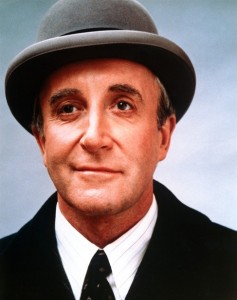
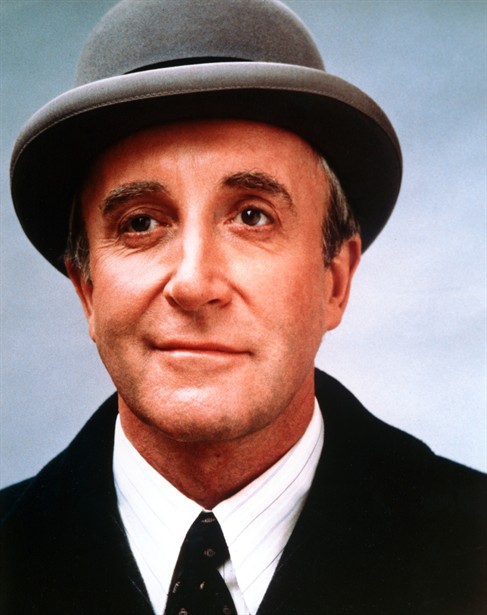 If you seek power over others, how much of an advantage does raw intelligence gain you?
If you seek power over others, how much of an advantage does raw intelligence gain you?
If you look at the makeup of the US Congress — which now has a 9% percent approval rating — or if you watch the Republican debates, you are not immediately inclined to label either the smart set. In fact, you have to be a dim bulb to repeatedly say many of the things that seem necessary for electability. On the other hand, a certain amount of cleverness is obviously necessary to outwit the media and your opponents.
Which is it? Two films that explore the relationship between power and brains are Being There (1979) and Limitless (2011). The films came out thirty years apart but deal with the same issues. Being There suggests that being dumb as a chicken is a huge advantage for those who seek political success. Limitless suggests that politics is the inevitable trajectory of a person who is far more intelligent than everyone else. Which is more realistic?
I’ll state my own view up front: politics is a gigantic waste of brains. If a person really has a gift for high-level thought, almost any profession would be a greater betterment to society and probably more self-fulfilling in the long run. Whereas it was probably once true that the political life attracted some of the best and brightest, it no longer seems true at all today.
Being There is both hilarious and serious, worth sitting down with at least once every few election seasons. Peter Sellers and Shirley MacLaine star in this adaptation of a novel by Jerzy Kosinski about an illiterate and simple-minded man named Chance who happened to be in the right place at the right time. His utterances are few and most concern what he has done his entire life, which has been to tend one garden on one estate and otherwise watch television.
[continue reading…]
Help Promote Prometheus Unbound by Sharing this Post





















